Out of the Shadows of the Maria Gordon notch: Sols 3328-3329
Sunday, 19 December 2021 05:26 Our Sol 3326 drive was successful, completing our shot through the Maria Gordon notch, with its spectacular structures and deep shadows, and continuing our climb up Mount Sharp. To keep MAHLI safe over the upcoming holiday break, this plan was the last chance to take images with MAHLI's cover open until we plan the sols post-holiday, so the team was on the hunt for a good target.
For MAHLI
Our Sol 3326 drive was successful, completing our shot through the Maria Gordon notch, with its spectacular structures and deep shadows, and continuing our climb up Mount Sharp. To keep MAHLI safe over the upcoming holiday break, this plan was the last chance to take images with MAHLI's cover open until we plan the sols post-holiday, so the team was on the hunt for a good target.
For MAHLI CesiumAstro accelerates Active Phased Array Payload development for Lunar applications
Sunday, 19 December 2021 05:26 CesiumAstro, Inc., with support from The National Aeronautics and Space Administration (NASA), is accelerating radio frequency (RF) active phased array antenna development enabling dual function communications and sensing for lunar and cislunar applications across common Ka-band, TDRS (Tracking and Data Relay Satellite), and 5G mmWave frequency bands.
High-performance communication links f
CesiumAstro, Inc., with support from The National Aeronautics and Space Administration (NASA), is accelerating radio frequency (RF) active phased array antenna development enabling dual function communications and sensing for lunar and cislunar applications across common Ka-band, TDRS (Tracking and Data Relay Satellite), and 5G mmWave frequency bands.
High-performance communication links f Production of electricity on the Moon is in the hands of Estonians
Sunday, 19 December 2021 05:26 Katriin Kristmann, a doctoral student in chemical and materials science at TalTech (Tallinn University of Technology), began research aimed at developing technology for the production of monograin layer solar cells on the Moon.
The results of the research activity are planned to be used to provide electricity to future lunar outposts of the European Space Agency (ESA) and its international
Katriin Kristmann, a doctoral student in chemical and materials science at TalTech (Tallinn University of Technology), began research aimed at developing technology for the production of monograin layer solar cells on the Moon.
The results of the research activity are planned to be used to provide electricity to future lunar outposts of the European Space Agency (ESA) and its international Preparations underway for moon landing
Sunday, 19 December 2021 05:26 China is making preparations for a moon landing that will place its astronauts on the lunar surface, according to a senior official at the China Manned Space Agency.
Dong Nengli, head of the agency's technology bureau, said at a news conference at the Publicity Department of the CPC Central Committee in Beijing on Friday afternoon that space program planners and engineers are researching t
China is making preparations for a moon landing that will place its astronauts on the lunar surface, according to a senior official at the China Manned Space Agency.
Dong Nengli, head of the agency's technology bureau, said at a news conference at the Publicity Department of the CPC Central Committee in Beijing on Friday afternoon that space program planners and engineers are researching t NASA's Juno Spacecraft 'Hears' Jupiter's Moon
Sunday, 19 December 2021 05:26 Sounds from a Ganymede flyby, magnetic fields, and remarkable comparisons between Jupiter and Earth's oceans and atmospheres were discussed during a briefing on NASA's Juno mission to Jupiter at the American Geophysical Union Fall Meeting in New Orleans.
Juno Principal Investigator Scott Bolton of the Southwest Research Institute in San Antonio has debuted a 50-second audio track generated
Sounds from a Ganymede flyby, magnetic fields, and remarkable comparisons between Jupiter and Earth's oceans and atmospheres were discussed during a briefing on NASA's Juno mission to Jupiter at the American Geophysical Union Fall Meeting in New Orleans.
Juno Principal Investigator Scott Bolton of the Southwest Research Institute in San Antonio has debuted a 50-second audio track generated Virgin Orbit Expands Space Solutions Business With Hypersat Investment
Sunday, 19 December 2021 05:26 Virgin Orbit, the responsive launch and space solutions company that has announced a planned business combination with NextGen Acquisition Corp. II, has announced an agreement to acquire a 17.5% stake in geospatial analytics company Hypersat LLC.
This investment will further expand Virgin Orbit's space solutions business by providing highly accurate electro-optic and hyperspectral imagery
Virgin Orbit, the responsive launch and space solutions company that has announced a planned business combination with NextGen Acquisition Corp. II, has announced an agreement to acquire a 17.5% stake in geospatial analytics company Hypersat LLC.
This investment will further expand Virgin Orbit's space solutions business by providing highly accurate electro-optic and hyperspectral imagery NASA confirms December 24 telescope launch
Sunday, 19 December 2021 05:26 The much-delayed launch of the James Webb space telescope will go ahead on December 24, NASA and the company overseeing the launch confirmed on Saturday.
The project, begun in 1989, was originally expected to deploy the instrument - which will be the largest and most powerful telescope ever to be launched into space - in the early 2000s.
But multiple problems forced delays and a tripli
The much-delayed launch of the James Webb space telescope will go ahead on December 24, NASA and the company overseeing the launch confirmed on Saturday.
The project, begun in 1989, was originally expected to deploy the instrument - which will be the largest and most powerful telescope ever to be launched into space - in the early 2000s.
But multiple problems forced delays and a tripli SpaceX launches Turkey’s Turksat 5B communications satellite
Sunday, 19 December 2021 04:51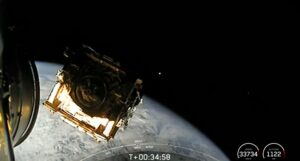
SpaceX successfully launched the Turksat 5B Turkish communications satellite Dec. 18, less than 16 hours after launching a batch of Starlink broadband spacecraft.
Falcon 9 sets reuse milestone with Starlink launch
Saturday, 18 December 2021 19:35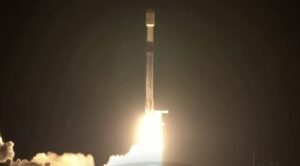
A SpaceX Falcon 9 launched a new set of Starlink satellites Dec. 18, setting a new reusability mark for the vehicle in the process.
SpaceX launches 52 Starlink satellites from California base
Saturday, 18 December 2021 18:58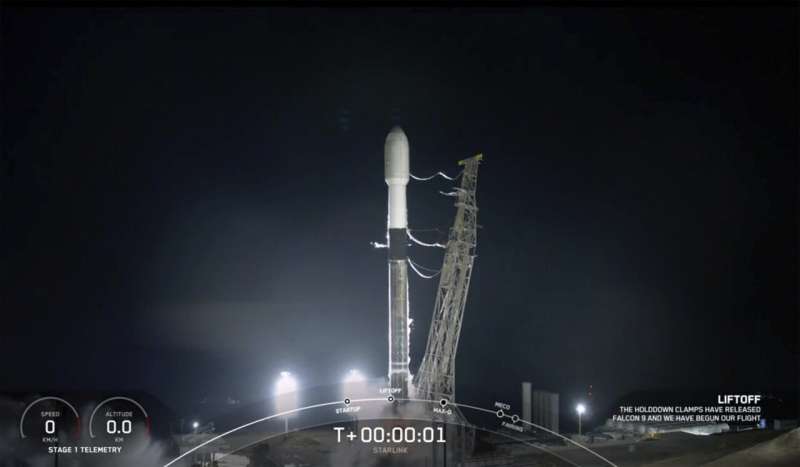
Cupola in 360° | Cosmic Kiss
Saturday, 18 December 2021 18:00 Video:
00:03:22
Video:
00:03:22
Join ESA astronaut Matthias Maurer inside the seven-windowed cupola, the International Space Station's "window to the world" and pan around to enjoy the view.
The ESA - European Space Agency-built Cupola is the favourite place of many astronauts on the International Space Station.
It serves not only as a unique photo spot, but also for observing robotic activities of the Canadian Space Agency's robotic arm Canadarm2, arriving spacecraft and spacewalks.
Just outside the cupola and behind Matthias is a portion of the Soyuz MS-19 crew ship docked to the Rassvet module and the Prichal docking module attached to the Nauka
New space telescope to uncover secrets of Universe's origins
Saturday, 18 December 2021 16:50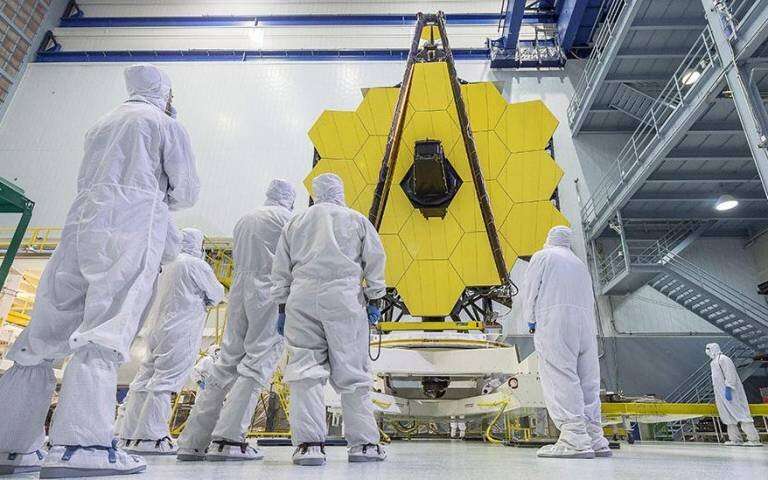
The NASA-led James Webb Space Telescope, which includes hardware designed and built at UCL and which will image the very first stars to shine in the Universe, is scheduled to be launched into space later this month.
The telescope, one of the great space observatories following Hubble, will be launched on-board the Ariane rocket from Europe's spaceport in French Guiana on or after Friday 24 December. It will take 30 days for the telescope to reach the Lagrange point 2, about a million miles from Earth, where it will begin operating. UCL astronomers will be among the first to analyse its observations of the Universe.
The mission—a partnership between NASA, the European Space Agency (ESA) and the Canadian Space Agency (CSA) – is expected to make breakthrough discoveries in all fields of astronomy by investigating the light of the Universe at (invisible) infrared wavelengths.
A team at the UCL Mullard Space Science Laboratory designed and built a key piece of hardware for one of the telescope's four instruments, a near-infrared spectrometer called the NIRSpec. About the size of a double bed, the NIRSpec measures light split into different wavelengths.
NASA Sets Coverage, Invites Public to View Webb Telescope Launch
Saturday, 18 December 2021 14:20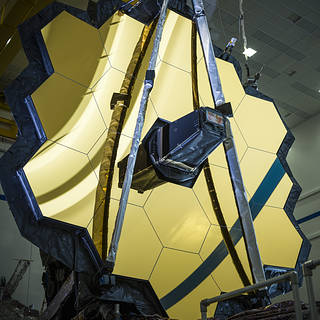 NASA will provide coverage of prelaunch, launch, and postlaunch activities for the James Webb Space Telescope, the world’s largest and most powerful space science telescope.
NASA will provide coverage of prelaunch, launch, and postlaunch activities for the James Webb Space Telescope, the world’s largest and most powerful space science telescope. Webb launch confirmed for 24 December
Saturday, 18 December 2021 12:30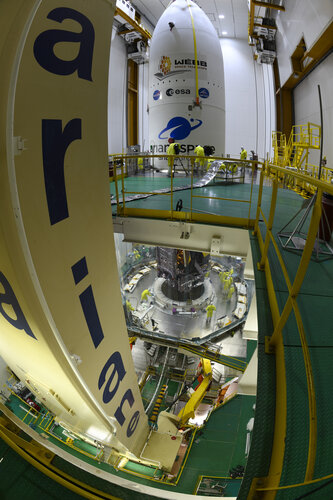
The James Webb Space Telescope is confirmed for the target launch date of 24 December, at 12:20 GMT / 13:20 CET.
Space Force celebrates second anniversary as arms race in space heats up
Saturday, 18 December 2021 12:18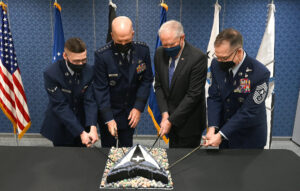
On the second anniversary of the U.S. Space Force, officials are calling attention to its accomplishments as well as looming challenges posed by Russian and Chinese anti-satellite weapons.

